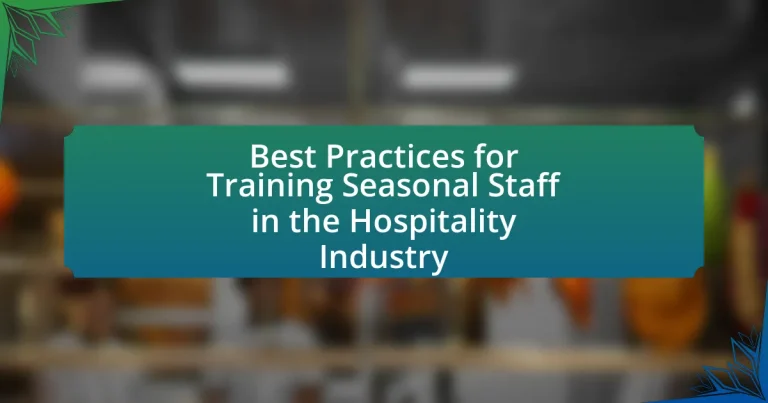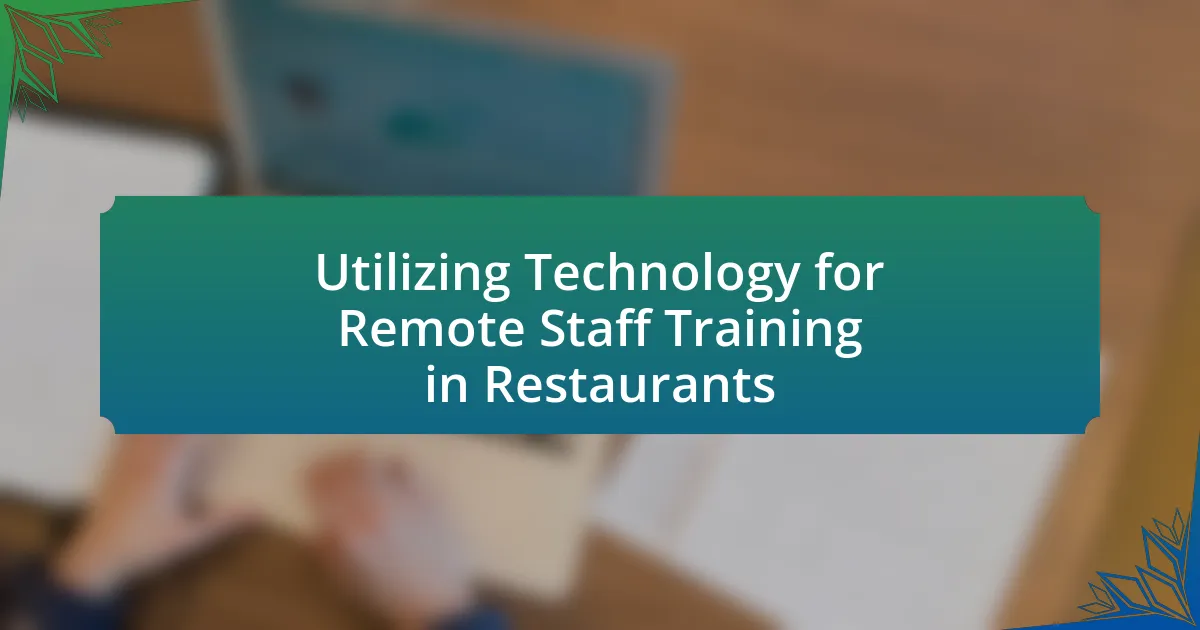The article focuses on best practices for training seasonal staff in the hospitality industry, emphasizing the importance of comprehensive onboarding, clear communication, hands-on training, and ongoing support. It highlights the significance of effective training in enhancing service quality, operational efficiency, and employee retention, while addressing challenges such as high turnover rates and varying experience levels among staff. Key components of a successful training program include orientation, job-specific training, customer service skills, and the use of technology to facilitate learning. The article also discusses the role of feedback and evaluation in improving training effectiveness and outlines common pitfalls to avoid during the training process.

What are the Best Practices for Training Seasonal Staff in the Hospitality Industry?
The best practices for training seasonal staff in the hospitality industry include comprehensive onboarding, clear communication of expectations, hands-on training, and ongoing support. Comprehensive onboarding ensures that seasonal employees understand the company’s culture, policies, and procedures, which is crucial for maintaining service quality. Clear communication of expectations helps staff understand their roles and responsibilities, reducing confusion and enhancing performance. Hands-on training allows seasonal staff to practice skills in real scenarios, which is essential for building confidence and competence. Ongoing support, such as regular check-ins and feedback, fosters a positive work environment and encourages continuous improvement. These practices are supported by industry research indicating that effective training increases employee retention and customer satisfaction, ultimately benefiting the business.
Why is effective training important for seasonal staff in hospitality?
Effective training is crucial for seasonal staff in hospitality because it enhances service quality and operational efficiency. Well-trained seasonal employees are better equipped to meet customer expectations, leading to higher satisfaction rates. According to a study by the Cornell University School of Hotel Administration, effective training can increase employee performance by up to 20%, directly impacting guest experiences and repeat business. Additionally, comprehensive training reduces onboarding time, allowing seasonal staff to quickly adapt to their roles and contribute positively to the team.
What challenges do seasonal staff face in the hospitality industry?
Seasonal staff in the hospitality industry face several challenges, including high turnover rates, limited training time, and varying levels of experience. High turnover rates can lead to a lack of continuity in service, affecting guest satisfaction. Limited training time often results in insufficient knowledge of procedures and standards, which can hinder performance. Additionally, varying levels of experience among seasonal workers can create inconsistencies in service quality, as some may require more guidance than others. These challenges can ultimately impact the overall efficiency and effectiveness of hospitality operations during peak seasons.
How does effective training impact customer service and satisfaction?
Effective training significantly enhances customer service and satisfaction by equipping staff with the necessary skills and knowledge to meet customer needs. When seasonal staff receive comprehensive training, they become more proficient in handling inquiries, resolving issues, and providing personalized service, which directly contributes to a positive customer experience. Research indicates that organizations with well-trained employees see a 10% increase in customer satisfaction scores, as trained staff are more confident and capable in their roles. This correlation underscores the importance of effective training in fostering a service-oriented culture that prioritizes customer satisfaction.
What key components should be included in a training program for seasonal staff?
A training program for seasonal staff should include orientation, job-specific training, customer service skills, health and safety protocols, and ongoing support. Orientation introduces staff to the company culture and policies, ensuring they understand expectations. Job-specific training equips employees with the necessary skills and knowledge to perform their roles effectively, which is crucial in the fast-paced hospitality environment. Customer service skills training enhances staff interactions with guests, directly impacting customer satisfaction and retention. Health and safety protocols are essential to ensure compliance with regulations and to maintain a safe working environment. Ongoing support, such as mentorship or regular check-ins, helps address challenges and reinforces learning, contributing to staff confidence and performance.
What are the essential skills that seasonal staff need to develop?
Seasonal staff in the hospitality industry need to develop essential skills such as customer service, adaptability, teamwork, and time management. Customer service skills are crucial as they directly impact guest satisfaction and retention; studies show that 70% of customers are willing to pay more for better service. Adaptability is vital due to the fast-paced and often unpredictable nature of the hospitality environment, allowing staff to respond effectively to changing situations. Teamwork enhances collaboration among staff, which is essential for smooth operations, especially during peak seasons. Time management skills enable seasonal staff to prioritize tasks efficiently, ensuring that service standards are met consistently.
How can training programs be tailored to different roles within hospitality?
Training programs can be tailored to different roles within hospitality by customizing content and delivery methods to meet the specific needs of each position. For instance, front-of-house staff, such as receptionists and servers, require training focused on customer service skills, communication techniques, and operational procedures, while back-of-house roles, like chefs and maintenance staff, need training on food safety, equipment handling, and technical skills.
Additionally, incorporating role-specific scenarios and simulations into training can enhance learning outcomes. Research indicates that targeted training improves employee performance and satisfaction, as evidenced by a study from the Cornell University School of Hotel Administration, which found that tailored training programs lead to a 20% increase in service quality ratings among staff.
How can technology enhance the training of seasonal staff?
Technology can enhance the training of seasonal staff by providing interactive and scalable learning solutions. For instance, e-learning platforms enable seasonal employees to access training materials anytime and anywhere, facilitating flexible learning that accommodates varying schedules. Additionally, virtual reality (VR) simulations can immerse staff in realistic scenarios, improving their practical skills and confidence before they engage with customers. According to a study by PwC, employees trained with VR are four times more focused than in the classroom environment, leading to better retention of information. Furthermore, mobile applications can deliver bite-sized training modules, allowing staff to learn on-the-go and reinforcing knowledge through quizzes and gamification. These technological advancements not only streamline the training process but also enhance engagement and knowledge retention among seasonal staff in the hospitality industry.
What tools and platforms are most effective for training delivery?
The most effective tools and platforms for training delivery in the hospitality industry include Learning Management Systems (LMS) like Moodle and TalentLMS, virtual training platforms such as Zoom and Microsoft Teams, and mobile learning applications like EdApp. These tools facilitate structured training, real-time interaction, and on-the-go learning, which are essential for seasonal staff who may have limited time for training. Research indicates that organizations using LMS report a 42% increase in employee engagement and a 34% improvement in training efficiency, demonstrating the effectiveness of these platforms in enhancing training delivery.
How can virtual training sessions be effectively implemented?
Virtual training sessions can be effectively implemented by utilizing interactive platforms that facilitate engagement and real-time feedback. These platforms should support features such as video conferencing, breakout rooms, and interactive polls to enhance participation. Research indicates that interactive training methods can increase retention rates by up to 60%, compared to traditional lecture-based approaches. Additionally, providing clear objectives and structured content helps participants understand expectations and outcomes, leading to more focused learning experiences. Regular assessments and follow-up sessions can further reinforce knowledge and skills, ensuring that seasonal staff in the hospitality industry are well-prepared for their roles.

What strategies can be employed to engage seasonal staff during training?
To engage seasonal staff during training, interactive training methods such as gamification, role-playing, and hands-on activities should be employed. These strategies enhance participation and retention of information, making the training experience more enjoyable and effective. For instance, gamification can increase motivation by incorporating elements like points and rewards, which have been shown to improve engagement levels significantly. Additionally, role-playing scenarios allow staff to practice real-life situations they will encounter, fostering confidence and competence. Research indicates that experiential learning methods, which include hands-on activities, lead to better retention of skills and knowledge, as they cater to various learning styles.
How can interactive training methods improve learning outcomes?
Interactive training methods can significantly improve learning outcomes by enhancing engagement and retention among participants. These methods, such as simulations, role-playing, and group discussions, actively involve learners in the training process, making the experience more memorable. Research indicates that active learning strategies can lead to a 50% increase in retention rates compared to traditional lecture-based approaches (Freeman et al., 2014, Proceedings of the National Academy of Sciences). By fostering collaboration and real-time feedback, interactive training not only boosts understanding but also encourages the application of skills in practical scenarios, which is particularly beneficial in the hospitality industry where customer service and teamwork are crucial.
What role does gamification play in training seasonal staff?
Gamification enhances the training of seasonal staff by increasing engagement and retention of information. By incorporating game-like elements such as points, badges, and leaderboards, training programs can motivate seasonal employees to participate actively and complete training modules. Research indicates that gamified training can lead to a 60% increase in engagement levels compared to traditional training methods, which is crucial in the hospitality industry where seasonal staff may have limited time to learn essential skills. This approach not only makes the learning process more enjoyable but also reinforces knowledge through interactive challenges, ultimately improving performance and customer service quality.
How can team-building exercises enhance training effectiveness?
Team-building exercises enhance training effectiveness by fostering collaboration and improving communication among team members. These activities create a supportive environment where participants can build trust and rapport, which is essential for effective teamwork in the hospitality industry. Research indicates that teams that engage in regular team-building activities demonstrate higher levels of cohesion and performance, leading to improved service delivery and customer satisfaction. For instance, a study published in the Journal of Applied Psychology found that team-building interventions can lead to a 20% increase in team performance metrics. This evidence supports the notion that incorporating team-building exercises into training programs can significantly enhance the overall effectiveness of training for seasonal staff in hospitality settings.
What are the best practices for onboarding seasonal staff?
The best practices for onboarding seasonal staff include providing comprehensive training, clear communication of expectations, and fostering a welcoming environment. Comprehensive training ensures that seasonal staff understand their roles and responsibilities, which is crucial in the fast-paced hospitality industry. Clear communication of expectations helps seasonal employees know what is required of them, reducing confusion and enhancing performance. Fostering a welcoming environment encourages engagement and retention, which is supported by research indicating that positive workplace culture leads to higher employee satisfaction and productivity. Implementing these practices can significantly improve the effectiveness of seasonal staff onboarding.
How can a structured onboarding process improve retention rates?
A structured onboarding process can significantly improve retention rates by providing new employees with clear expectations, comprehensive training, and a sense of belonging. Research indicates that organizations with effective onboarding programs can increase employee retention by 82% and productivity by over 70%. This structured approach helps seasonal staff in the hospitality industry acclimate quickly, understand their roles, and feel valued, which reduces turnover. Furthermore, a well-defined onboarding process fosters engagement and loyalty, as employees are more likely to stay with an organization that invests in their development and integrates them into the company culture.
What information should be prioritized during the onboarding phase?
During the onboarding phase, the information that should be prioritized includes company policies, job responsibilities, and customer service standards. Company policies provide essential guidelines on workplace behavior, compliance, and safety protocols, ensuring that seasonal staff understand the expectations and legal requirements. Job responsibilities clarify specific tasks and roles, enabling employees to perform effectively from the start. Customer service standards are crucial in the hospitality industry, as they directly impact guest satisfaction and retention; training staff on these standards helps maintain a consistent and high-quality experience for customers.

How can feedback and evaluation improve training for seasonal staff?
Feedback and evaluation can significantly enhance training for seasonal staff by identifying areas for improvement and reinforcing effective practices. By systematically gathering feedback from both trainers and trainees, organizations can pinpoint specific skills or knowledge gaps that need addressing, ensuring that training is tailored to meet the actual needs of the staff. For instance, a study by the American Society for Training and Development found that organizations that implement regular feedback mechanisms see a 14% increase in employee performance. This data underscores the importance of continuous evaluation in refining training programs, ultimately leading to a more competent and confident seasonal workforce in the hospitality industry.
What methods can be used to assess the effectiveness of training programs?
To assess the effectiveness of training programs, organizations can utilize methods such as pre- and post-training assessments, participant feedback surveys, and performance metrics analysis. Pre- and post-training assessments measure knowledge or skill acquisition by comparing results before and after the training, providing quantitative data on learning outcomes. Participant feedback surveys gather qualitative insights on the training experience, allowing for adjustments based on learner perceptions. Performance metrics analysis evaluates changes in employee performance indicators, such as customer satisfaction scores or sales figures, directly linked to the training received. These methods collectively provide a comprehensive evaluation of training effectiveness, ensuring that programs meet their intended goals.
How can feedback from seasonal staff inform future training initiatives?
Feedback from seasonal staff can significantly inform future training initiatives by identifying gaps in current training programs and highlighting areas for improvement. Seasonal staff, who often experience the training firsthand, can provide insights into the effectiveness of training materials, the clarity of instructions, and the relevance of the skills taught. For instance, a study by the Cornell University School of Hotel Administration found that incorporating employee feedback into training design led to a 20% increase in staff retention and performance metrics. This demonstrates that utilizing feedback not only enhances training relevance but also contributes to better overall operational efficiency in the hospitality industry.
What metrics should be tracked to measure training success?
To measure training success, key metrics include employee performance, retention rates, and customer satisfaction scores. Employee performance can be assessed through evaluations and productivity metrics, indicating how well staff apply training in their roles. Retention rates reflect the percentage of seasonal staff who return for subsequent seasons, demonstrating the effectiveness of the training in fostering loyalty and engagement. Customer satisfaction scores, often gathered through surveys, provide insight into how well-trained staff meet guest expectations, directly linking training quality to service outcomes. These metrics collectively offer a comprehensive view of training effectiveness in the hospitality industry.
What are some common pitfalls to avoid when training seasonal staff?
Common pitfalls to avoid when training seasonal staff include inadequate onboarding, lack of clear communication, and insufficient training resources. Inadequate onboarding can lead to confusion and decreased productivity, as new hires may not fully understand their roles or the company’s expectations. Lack of clear communication can result in misunderstandings and errors, negatively impacting customer service. Insufficient training resources, such as manuals or hands-on practice, can leave staff unprepared for their tasks, leading to mistakes and frustration. According to a study by the Society for Human Resource Management, organizations that invest in comprehensive training programs see a 24% increase in employee performance, highlighting the importance of effective training for seasonal staff.
How can lack of clarity in training objectives hinder performance?
Lack of clarity in training objectives can significantly hinder performance by creating confusion among employees regarding their roles and responsibilities. When training objectives are not clearly defined, staff may struggle to understand what is expected of them, leading to inconsistent service delivery and decreased efficiency. Research indicates that organizations with well-defined training objectives see a 20% increase in employee performance, as clear goals provide direction and motivation. Without this clarity, employees may feel disengaged or overwhelmed, ultimately impacting customer satisfaction and operational effectiveness in the hospitality industry.
What are the consequences of inadequate training resources?
Inadequate training resources lead to decreased employee performance and increased turnover rates. When seasonal staff in the hospitality industry lack proper training, they struggle to meet job expectations, resulting in poor customer service and operational inefficiencies. Research indicates that organizations with insufficient training experience a 218% higher income per employee when compared to those with robust training programs, highlighting the financial impact of inadequate resources. Furthermore, a study by the Association for Talent Development found that companies investing in training see a 24% higher profit margin, underscoring the importance of adequate training resources for maintaining a competitive edge in the hospitality sector.
What practical tips can enhance the training experience for seasonal staff?
To enhance the training experience for seasonal staff, implement structured onboarding programs that include clear objectives and timelines. Structured onboarding ensures that seasonal employees understand their roles and responsibilities from the outset, which can lead to increased confidence and productivity. Research indicates that organizations with formal onboarding processes experience 54% greater new hire productivity and 50% greater retention rates (Bauer, 2010, “Onboarding: The Power of Connection,” SHRM). Additionally, incorporating hands-on training and mentorship can facilitate practical skill development and foster a supportive work environment, further improving the overall training experience.




